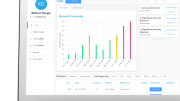The global IoT medical devices market is set to expand at a stellar pace in coming years owing to the rising number of government initiatives across the world that support the expansion of digital health services. By providing ease and facilitate real time data access through usage of connected devices smart healthcare solutions offer enhanced medical assistance to people. Products in the global IoT medical devices market utilize both the help of medical professional as well as technical capabilities of artificial technology to aid patients.
Some of the major drivers for the expansion of the global IoT medical devices market include rising need for cost effective solutions in medical and healthcare sectors, increase in the incidence of chronic health conditions such as cancer, cardiovascular diseases, arthritis, and diabetes, and the rising burden it creates on the healthcare facilities and infrastructure. Furthermore, rising number of new medical centers and hospital set-ups in various parts of the world are also creating new opportunities in the global IoT medical devices market.
Increasing Focus on Patient Safety Fuels Demand in IoT Medical Devices Market
Patient engagement and patient care are contemporarily given more importance in the field of healthcare. This has also boosting the growth in the global IoT medical devices market. Moreover, rising number of patients and their family members are opting for products in order to gain proper and efficient hospital care. Increasing focus on the safety of patients is anticipated to create new avenues for expansion of the global IoT medical devices market in coming years.
Rising usage of new networking technologies as well as inception of high speed internet services has propelled the demand for healthcare IoT products and services. Furthermore, increasing usage of smart mobile computing devices such as smartphones and tablets is also expected to encourage the usage of products in the market in coming years, Although the high cost of deployment associated with connected medical devices and equipment may pose as a restraint for the healthcare market in current times, it is anticipated to draw more revenue into the industry in the long run.
Major regions functional within the global IoT medical devices market include Middle East and Africa, Latin America, Europe, North America, and Asia Pacific. Geographically, Asia Pacific region is projected to exhibit stunning growth rate in coming years owing to rising number of governmental initiatives promoting the usage of eHealth solutions, increasing medical tourism in the region, rising demand for quality healthcare facilities and services, and rising awareness among regional population about IoT products.
Players in the IoT Healthcare Market
Some of the major incumbent players operational within the global IoT medical devices market include Welch Allyn, Hill-Rom, Koninklijke Philips N. V., Medtronic, Johnson & Johnson Services, Inc., Siemens AG, and Boston Scientific Corporation, among others. Players and stakeholders in the global IoT healthcare market are adopting various growth and expansion strategies including strategic partnerships, mergers and acquisitions, and product innovations to capture a dominant industry position. For example, Surgical Theater and Medtronic announced a partnership in 2021 which interfaces Medtronic’s surgical navigation system called ‘StealthStation S8’ with Surgical Theater’s augmented reality technology ‘SyncAR’.
EarlySense was acquired by Hill-Rom in 2021 in order to build a differentiated suite comprising of connected devices solutions to improve patient outcomes. Furthermore, Insulet and Abbott partnered up in 2020 to provide automated insulin delivery through glucose sensing.
Source: Transparency Market Research





